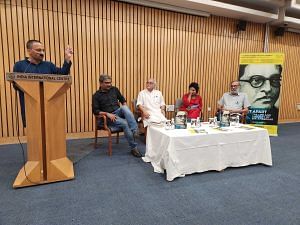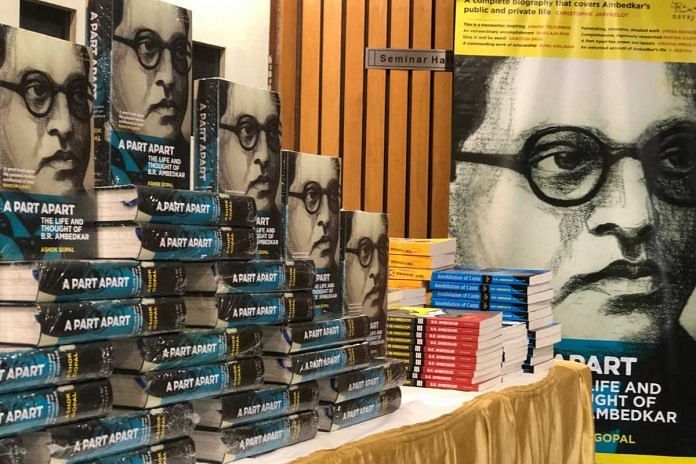Do we really need another biography of Ambedkar?
The question can be a politically loaded one. But when it is the opening question at the launch of a new book titled A Part Apart: The Life and Thought of BR Ambedkar by Ashok Gopal, it gets a philosophical answer.
“For as many versions of Ambedkar there are in all our minds, there must be as many biographies,” said Vijeta Kumar, an English literature teacher from Bengaluru, who was moderating the 14 April book launch at Delhi’s India International Centre.

She then quoted the Latin American writer Julio Cortazar’s line: “It’s entirely possible to live life without thinking.”
Reading Ambedkar biographies is an act of resistance against this, she said.
The book by Ashok Gopal is the newest addition to the growing universe of Ambedkar scholarship. But what sets it apart is that it doesn’t deify Ambedkar and shows his internal intellectual journey – how he evolved, navigated through Congress politics and kept upgrading his arguments. He was a man unafraid of revisiting his earlier conclusions, but he was also someone who challenges lazy 21st-century ideological boxes.
Gopal, who was a Pune-based journalist and education content developer before he started writing the book, said he came upon Ambedkar’s life and work by reading Dalit Marathi literature. Until then, he was quite oblivious to him. And it was possible to survive with this ignorance, he said.
“If you are not a Dalit, you can go through life without knowing much about Ambedkar and without being aware of caste,” said Gopal, who conducted most of his research on the subject during the Covid-19 lockdown. “You need either a jolt or some experience or literature to know Ambedkar.”
The publisher’s note on Gopal describes him as “almost ungoogleable” and without any social media presence before he wrote the book.
Also read:
A love letter and Dalit joy
The book takes Ambedkar’s life story and juxtaposes it with his writings, speeches – in English and Marathi – and also all that he read. Authors until now were either writing in English without referring to Marathi sources or were writing in Marathi but not referring to English sources, Gopal said, adding that it was “inexcusable”.
For the last three decades, Ambedkar has become a demi-God, and his life’s story inviolable. The new book strips him of his halo, portrays his complexities and contradictions. It includes his changing positions toward Gandhi during the 1932 Poona Pact negotiations, his distaste for the bland beef that was served in the United States, how he viewed Vinayak Damodar Savarkar in the beginning, how he fasted and participated in Hindu festivals till the mid-1920s, how he could quote the Bhagavad Gita till 1930 and even told a court that he considered himself a Hindu, how he arrived at the idea of religious conversion, and a love letter to his second wife, Sharda Kabir.
“The love letter is proof that accessing joy doesn’t make you less of a Dalit, not enjoying the taste of beef doesn’t make you less of a Dalit,” said Vijayata.
Panellists at the event said the book also revealed Ambedkar’s love for playing the violin, gardening and dogs. Unlike many other Indian leaders, Ambedkar saw Buddha as a social revolutionary, not a spiritual and cultural figure.
“He fashioned his own Buddha,” said Gopal.
Also read: How Ambedkar was both ‘Dalitised’ and ‘Brahminised’ by Indian ruling class to own history
No judgement please
Biography writing doesn’t come naturally to Indians, said Congress leader Jairam Ramesh, a panellist. There are either hagiographies or scurrilous, condemnatory work. But Gopal’s book, he said, is an archival, narrative biography, not a judgemental one.
The audience was made up of scholars and activists, and included Dhrupad maestro Ustad Wasifuddin Dagar, content creator and podcaster Anurag Minus Verma; Manoj Mitta, author of a new book titled Caste Pride: Battles for Equality in Hindu India; Sahapedia founder Sudha Gopalakrishnan and anti-caste activist Sunil Sardar.
Does the book contain any mistakes that Ambedkar may have committed, Sardar asked.
Ramesh grabbed the microphone and replied that readers need to view historical figures in their context and not “go for retrospective judgement”.
Also read: How Dalit leaders created rift between Ambedkar’s savarna wife and son after he died
‘Just did the typing’
The 864-page biography contains three maps, 70 photographs, letters and documents collected from a number of sources, including 70-year-old Ambedkarite archivist Vijay Surwade.
In the end, who really owns a biography is a question that bedevils every biographer.
And this question is even more complicated in Ambedkar’s case. Gopal said his name exists solo on the Navayana Publishers’ book cover for legal reasons only because the authorship truly belongs to so many people who have followed and documented Ambedkar’s life for decades.
“Ninety per cent of the material in the book is sourced. Primary collection was done by Dalit archivists. We are all just riding on that work done by unknown, unsung and unfunded archivists,” said Gopal.
“What I have done is the typing.”
This is also the reason why he declined requests for signing the book copies.
Rama Lakshmi is Opinion and Ground Reports Editor at ThePrint. Views are personal.
(Edited by Zoya Bhatti)



